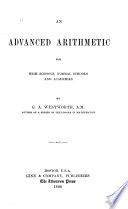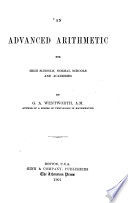 | George Albert Wentworth - Arithmetic - 1898 - 424 pages
...without breadth or thickness. Liter. The unit of capacity in the metric system. Logarithm of a number. The exponent of the power to which the base must be raised to obtain the given number. Long division. The method of dividing in which the processes are written in... | |
 | George Albert Wentworth - Arithmetic - 1898 - 424 pages
...without breadth or thickness. Liter. The unit of capacity in the metric system. Logarithm of a number. The exponent of the power to which the base must be raised to obtain the given number. Long division. The method of dividing in which the processes are written in... | |
 | Benjamin Osgood Peirce - 1899 - 146 pages
...ambm, Hence, (Г71 =—, a° = 1, a1/n = ^. a" Definition; The logarithm of a number, to any base, is the exponent of the power to which the base must be raised to pro duce that number. Thus, if x = Iog0 N, then ax = N. In particular, log 1=0, log (base) = 1. General... | |
 | Peder Lobben - Mechanical engineering - 1899 - 460 pages
...Briggs system of logarithms has for its modulus 0.4342945, and 10 for its base. Therefore the Briggs logarithm of a number is the exponent of the power to which 10 must be raised in order to give the number. Thus : Log. 1=0 because 10° = 1. " 10 = 1 " 10t = 10.... | |
 | International Correspondence Schools - Mining engineering - 1900 - 728 pages
...must br raised to produce a given number. The base of the common system is 10, and, as a logarithm is the exponent of the power to which the base must be raised in order to be equal to a given number, all numbers are to be regarded as powers of 10; hence, 10°... | |
 | George Albert Wentworth - Trigonometry - 1901 - 176 pages
...Properties of Logarithms. Any positive number being selected as a base, the logarithm of any other positive number is the exponent of the power to which the base must be raised to produce the given number. Thus, if a" = N, then n = \ogaF. This is read, и is equal to log N to the base a. Let a be the base,... | |
 | Robert Wahl, Max Henius - Brewing - 1902 - 1288 pages
...subtract I, divide the remainder by the ratio less I, multiply the quotient by the first term. LOGARITHMS. The logarithm of a number is the exponent of the power to which it is necessary to raise a fixed number to produce the given number. This fixed number or "base" in... | |
 | Middlesex Alfred Bailey - Algebra - 1902 - 336 pages
...multiplier to produce the same result as a given number used once as a multiplier. The common definition, " The logarithm of a number is the exponent of the power to which a base must be raised to produce a given number," must be accepted in this sense. The number that is... | |
 | John William Bradshaw - 1903 - 76 pages
...student of mathematics and physios meets logarithms for the first time at an early stage. He is told that "the logarithm of a number is the exponent of the power to which a certain number, taken as the ba.se, must be raised in order to equal the given number." The definition... | |
 | Leonard Elliott Brookes - Horse-power (Mechanics) - 1905 - 106 pages
...the power of the other number, which is denoted by the exponent, equal to the former. In other words, the logarithm of a number is the exponent of the power to which the number must be raised to give a given base. When the logarithms of numbers form a series in arithmetical... | |
| |